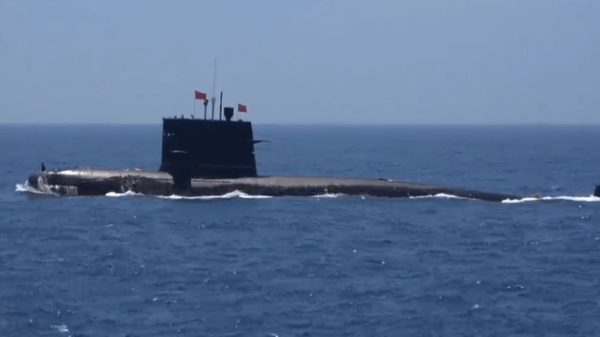[By Richard Herr]
In his statement to the Solomon Islands parliament on the draft security agreement between his country and Beijing, Prime Minister Manasseh Sogavare stridently but disingenuously denied ‘pitching into any geopolitical power struggle’.
Despite the shared fears of Sogavare’s domestic critics—one of whom leaked a copy of the draft—and knowing that virtually all of its Western friends profoundly disagreed, the Solomon Islands government has now inked the agreement.
It’s not clear if the signed version is different in any important aspect from the leaked version, but even a significant sanitising of the language wouldn’t undo the damage this event has done to both signatory countries.
In a three-page letter to Sogavare, the president of the Federated States of Micronesia, David Panuelo, set out very clearly the reasons why Solomons security ties with China would pitch the region into the broader geopolitical power struggle.
The letter is particularly significant because it was written from the perspective of the only one of the three Micronesian entities in a freely associated relationship with the US to recognise the People’s Republic of China. (The other two are Marshall Islands and Palau.)
Panuelo argues that, while the Solomons enjoys agency as an independent state to pursue its national interest, it has an obligation to its people, to the region and even to global security to use its agency with prudence. Sogavare has an obligation to recognise that his decisions have consequences for others in the region.
The language and substance of the draft agreement betray its origins in Beijing and thus serve to identify China’s ambitions in the Solomons and by extension the region more generally.
The implied preferential extraterritoriality in the draft allowing China to use its military ‘to protect the safety of Chinese personnel and major projects’ raises concerns beyond Solomons Islands.
The safety of Chinese personnel and their property has been a legitimate concern at several critical points in the Solomons’ history—most notably during the riots in April 2006 and November 2021. Nevertheless, privileging the protection of major Chinese projects goes beyond such events and has an ominous ring regionally.
The Sogavare government signed on to China’s Belt and Road Initiative in 2019 within days of switching recognition from Taipei to Beijing. The association of direct protection by the People’s Liberation Army of BRI projects regionally would be an even more damaging trope for China than ‘debt-trap diplomacy’.
This is not an impossible stretch. Observers have noted that a feature of Chinese contributions to UN peacekeeping missions has been a bias towards protecting China’s commercial assets.
On 31 March, the Australian Defence Force’s joint operations chief, Lieutenant General Greg Bilton, spoke publicly of the consequences of a Chinese military presence on ADF operations. While Bilton was careful to use the language of conditionality, the security agreement has already thrown an enormous rock into the Pacific pond and the ripples will affect all members of the free and open Indo-Pacific project.
The references in the draft agreement to military personnel, armed forces and ship visits with stopover and transition arrangements give rise to justifiable concerns that it will legitimise prepositioning of Chinese military stores as a precursor to a secure naval precinct on its way to a full-blown military base under the pretext of protecting Chinese interests.
The immediate-term objective for Beijing, apparently shared and supported by Sogavare, has been to achieve some parity with Canberra’s security treaty with Honiara signed after the Australian-led Regional Assistance Mission to Solomons Islands ended. A long-term objective in light of last year’s AUKUS announcement may be to focus Australia’s security concerns closer to home and away from the South China Sea.
A belated public declaration that the Solomons would never allow a Chinese military base is scarcely likely to settle concerns.
The Sogavare government’s dissembling and lack of transparency on the switch in recognition to Beijing, the secrecy provisions in the draft agreement and the smuggling of replica military-grade Chinese weapons to the Solomons for police training have intensified the trust issues regarding Chinese ambitions.
Even where local opinion minimises the likelihood of any intended military objectives in or through Solomon Islands, the security agreement is recognised as troubling at the domestic level.
The privileged protection of major Chinese projects is laden with risk, particularly with regard to inflaming interethnic rivalries and possibly leading to outright conflict.
There are serious tensions between the government of the Solomons’ largest province, Malaita, and the Sogavare government. Malaita Premier Daniel Suidani has vowed to never allow Chinese money into Malaita.
The continuing resistance of the province to accepting Chinese aid projects is a source of annoyance to Honiara. The use of Chinese police or military personnel to protect a major development project forced on Malaita would very likely reignite the deadly civil conflict of two decades ago.
Another potential flashpoint is also on the horizon. Opposition leader Matthew Wale has warned that there may be a constitutional crisis looming as Sogavare appears to want to extend the life of his government by postponing national elections due next year until 2024.
Acknowledging the media reports of this proposal, Governor-General David Vunagi warned that it would require constitutional change approved by parliament.
Although some constitutional provisions require a three-quarters vote, it appears that this change might need only two-thirds of the parliament. If that’s true, judging by the no-confidence vote Sogavare survived in December 2021, the numbers could be there for such a change.
A serious constitutional crisis where a third of the population strongly resent an attempt to extend the life of the Sogavare government could reignite interethnic conflict, which is why Australian troops are currently on Guadalcanal.
Just how far would Beijing go to protect a government that has delivered so much to China? Equally, how far would Canberra go to defend the democratic values required under the Biketawa Declaration if a competent authority such as the governor-general made the request?
One thing is certain: the regional security egg has been scrambled. There’s no way back to the sense of manageable balance that existed before the leaking of the draft agreement.
Whatever financial advantage the Sogavare government thinks its leveraging of sovereignty has won for it, the precautionary cost in the security response of states unable to trust the Solomons’ promises is likely to be much higher.
Richard Herr is academic director of the parliamentary law course at the University of Tasmania and a former honorary director and adjunct professorial fellow in the Centre for International and Regional Affairs at the University of Fiji. He was awarded an AusAID Peacebuilder award in 2002 for work in Solomon Islands.
The opinions expressed herein are the author's and not necessarily those of The Maritime Executive.
Source www.maritime-executive.com
 The Solomon Islands' security deal with China has raised questions about the possibility of a PLA Navy base in the archipelago (PLA file image)
The Solomon Islands' security deal with China has raised questions about the possibility of a PLA Navy base in the archipelago (PLA file image)




.jpg)




